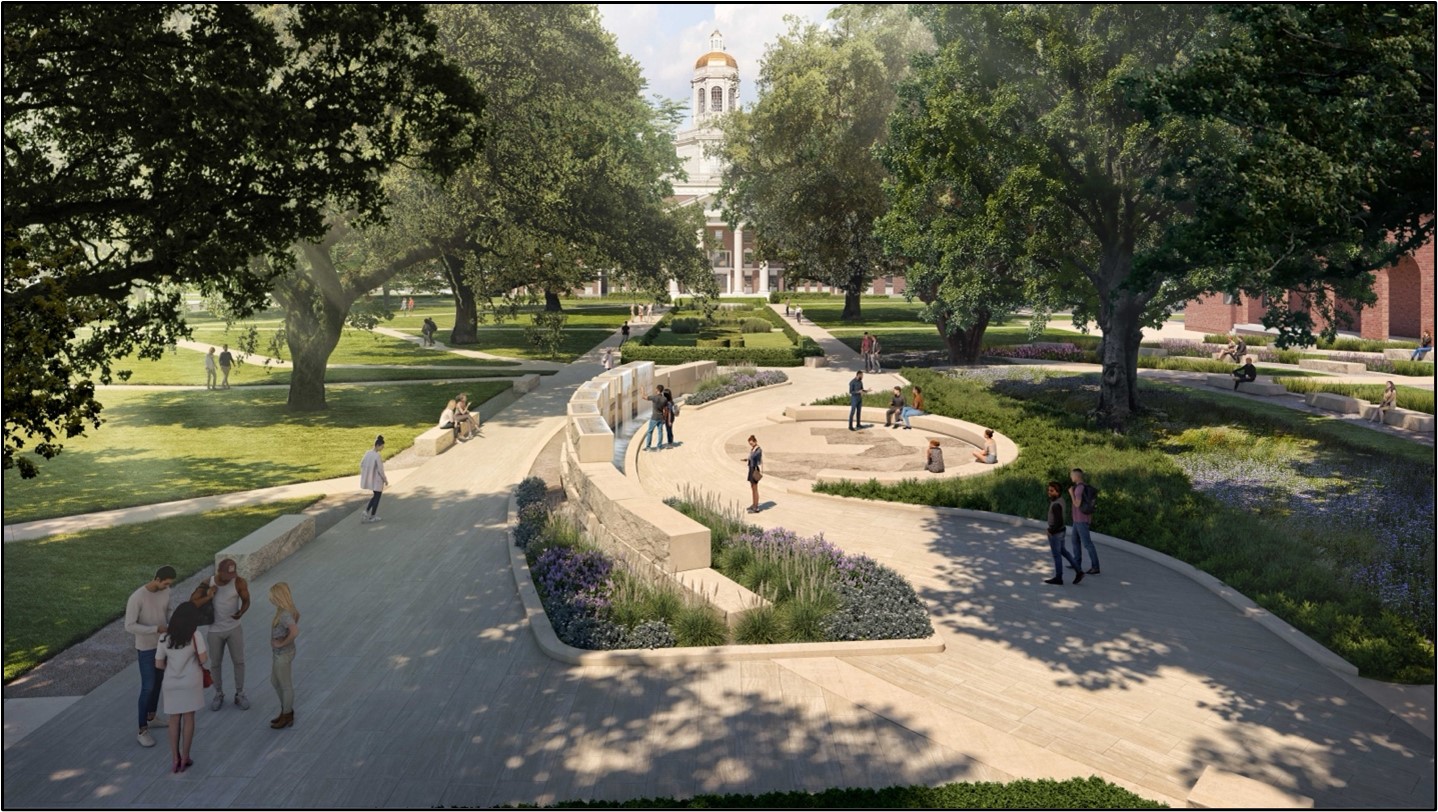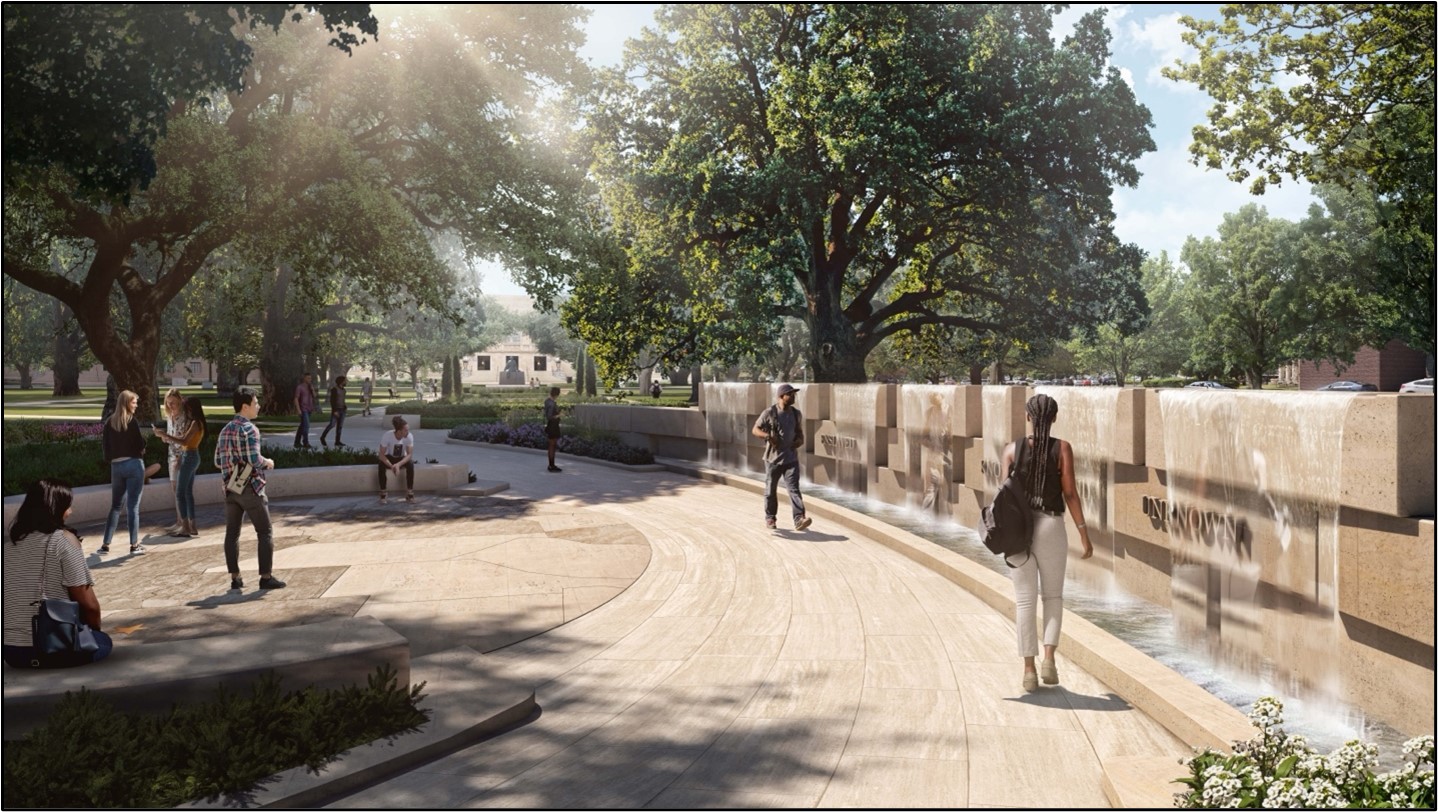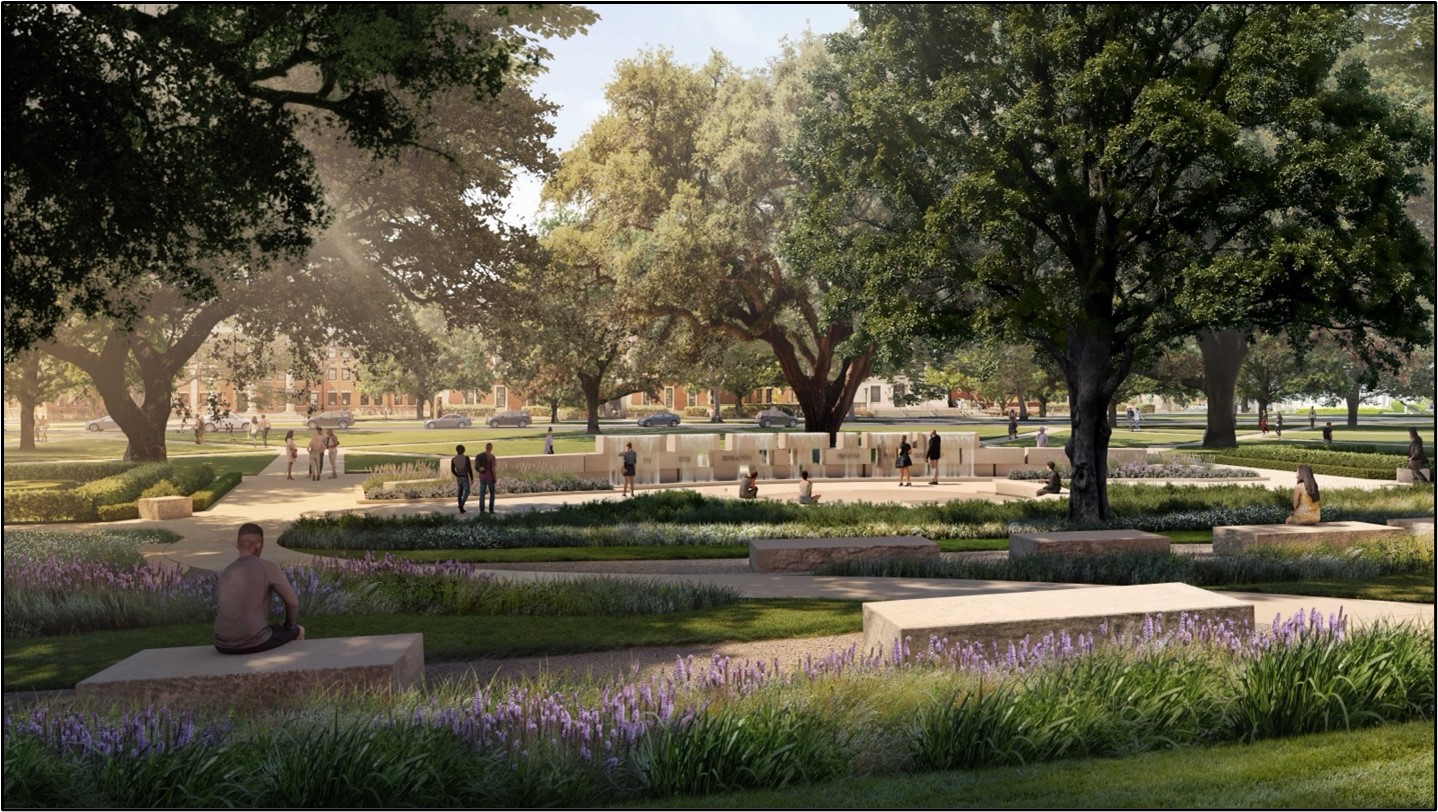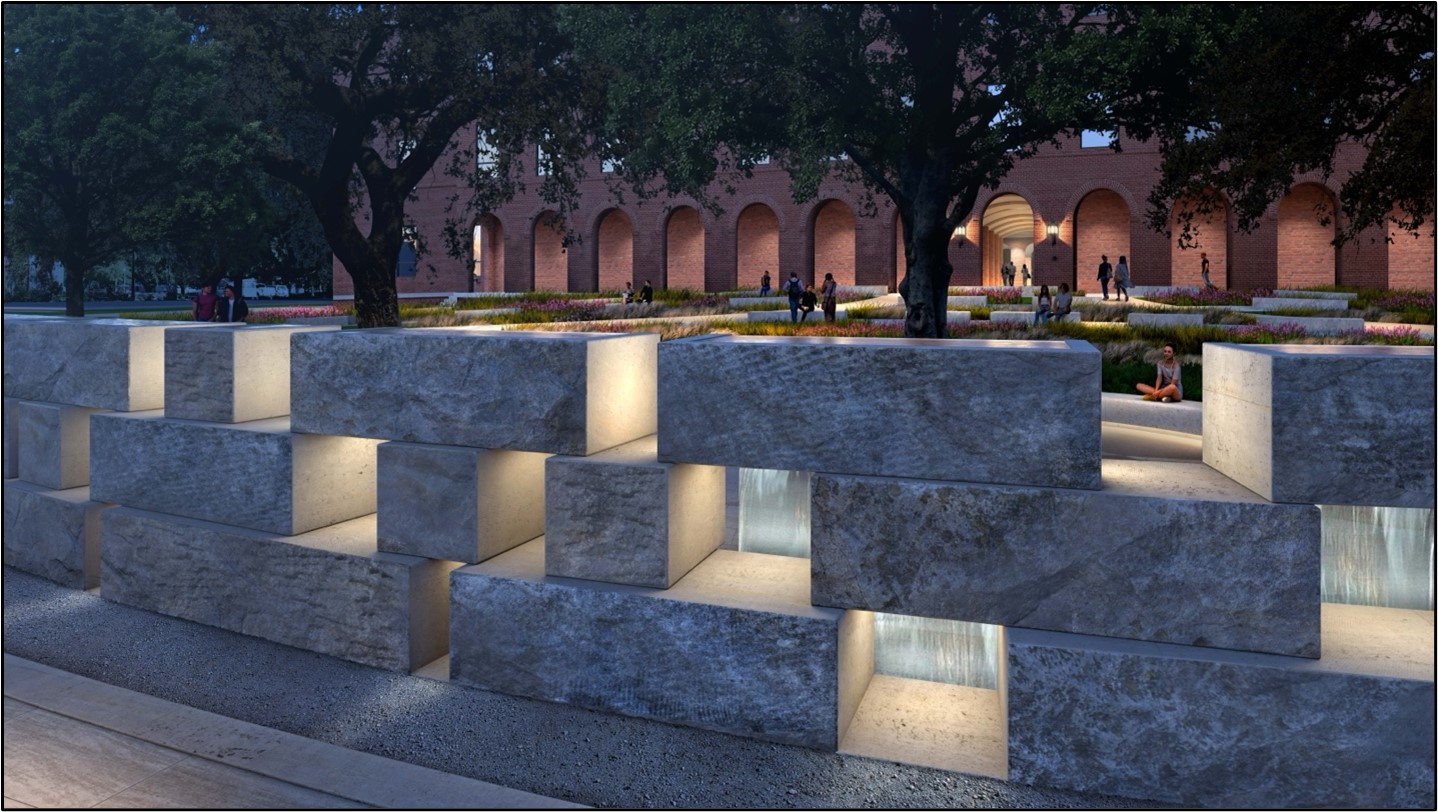Ceremonial Groundbreaking of Memorial to Enslaved Persons Highlights Baylor Board of Regents Meeting
Regents approve final residence hall renovations, tuition for 2024-25, new undergraduate computer engineering degree and affirm new Faculty, Student and Alumni-elected Regents, among other business
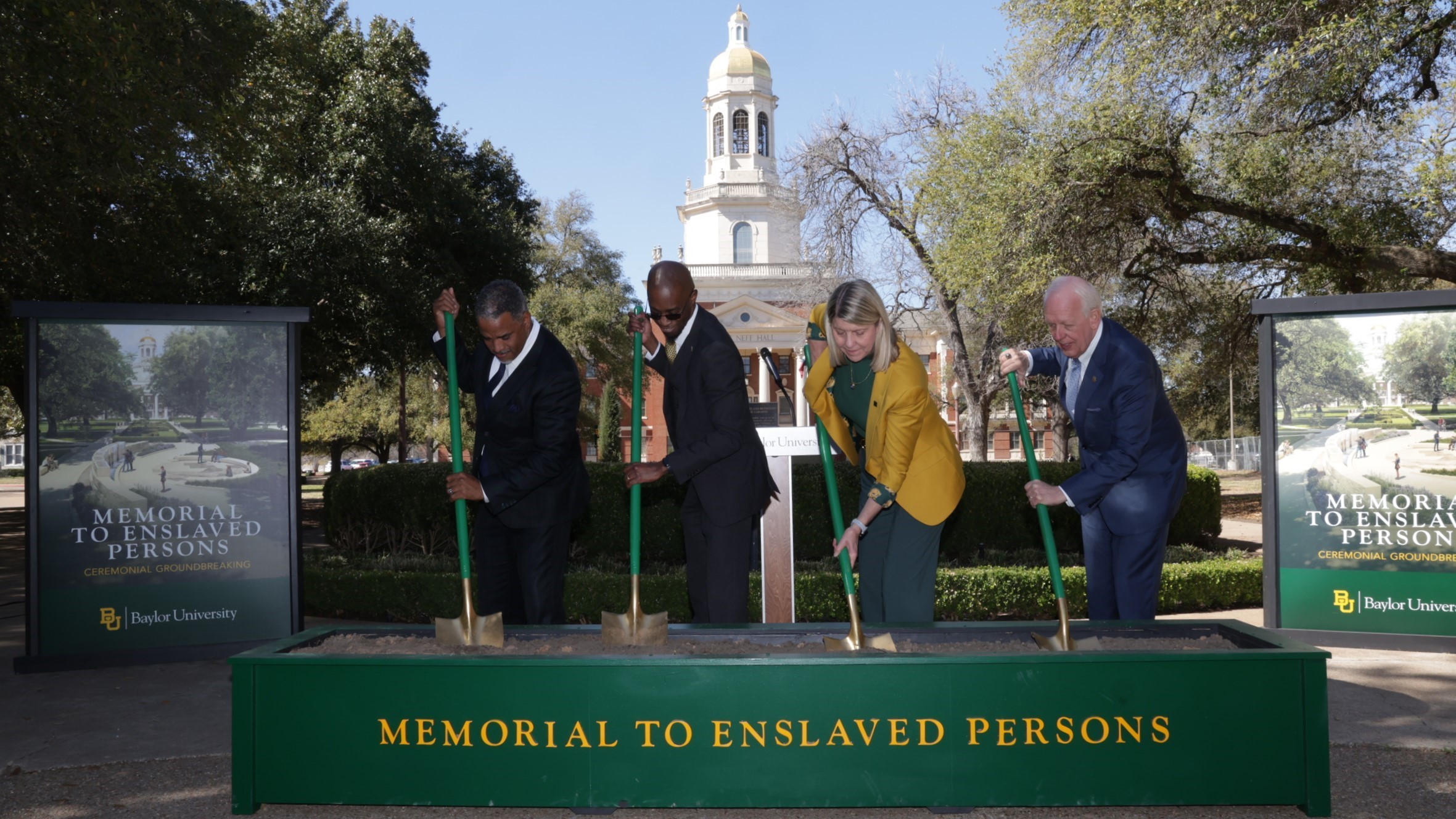
(L to R) - Baylor Regent and Commission on Historic Campus Representations member Michael McFarland, B.B.A. ’93, Ed.D. ’05, Commission Member Rev. Dr. Malcolm Foley, Ph.D. ’21, President Linda A. Livingstone, Ph.D., and Board of Regents Chair William E. Mearse, B.B.A. ’78, M.B.A. ’79, participated in a ceremonial groundbreaking for the Memorial to Enslaved Persons. (Robert Rogers/Baylor University)
Contact: Lori Fogleman, Baylor University Media and Public Relations, 254-709-5959
Follow us on X (Twitter): @BaylorUMedia
WACO, Texas (Feb. 23, 2024) – Gathering on Baylor University’s historic Founders Mall alongside members of the University and Waco communities, the Baylor Board of Regents concluded its regular quarterly meeting today with a ceremonial groundbreaking of the Memorial to Enslaved Persons. One of the recommendations in the final report from the University’s Commission on Historic Campus Representations – which was unanimously accepted by the Regents in February 2021 – the Memorial will recognize the enslaved men, women and children who were instrumental in building Baylor’s original campus in Independence, Texas.
In May 2022, Regents approved a four-phase framework to address strategic priorities identified by the Commission. Phase 1 is complete, with renowned architectural design firm Sasaki having been selected for the new Campus Experience Project. Phase 2 is underway with today’s groundbreaking and the additional historical context to be placed around the existing Judge R.E.B. Baylor statue in the near future.
“When Baylor was founded in 1845, chattel slavery was deeply woven into the cultural and economic fabric of the state of Texas. Our three primary founders – including our namesake Judge Baylor – were both religious leaders and slaveholders,” Baylor President Linda A. Livingstone, Ph.D., said. “We believe the incompatibility of Baylor’s Christian mission and its roots in chattel slavery requires a collective reckoning with this legacy, and the additional context around Judge Baylor’s statue will connect his story to the enslaved persons being recognized through the Memorial.”
Designed by Sasaki with input from the Campus Experience Project Team and student representatives, the Memorial will create new areas of reflection, gathering and community on Founders Mall. Its key features include:
- A cascading water feature constructed of the same limestone used to build the University’s original campus in Independence;
- Foundational scriptures intended to remind visitors of the freedom all men and women have in Christ now and should have experienced when Baylor was founded in 1845;
- A population density map inlayed in the ground in front of the Memorial depicting the number of enslaved individuals in the counties where Baylor was, circa 1860, and is located; and
- A new Resonance Garden – to complement the iconic Sadie Jo Black Gardens and the Joy Reynolds Rose Gardens – for individual and collective reflection.
Since construction on the Memorial will not begin until after Baylor’s May commencement, the ceremonial groundbreaking included a “turning of the dirt,” using soil from Independence that will later be incorporated into the project. Participants in the ceremony were Board of Regents Chair William E. Mearse, B.B.A. ’78, M.B.A. ’79, President Livingstone, Regent and Commission Co-Chair Alicia D. H. Monroe, M.D., Regent and Commission Member Michael McFarland, B.B.A. ’93, Ed.D. ’05, and Commission Member Rev. Dr. Malcolm Foley, Ph.D. ’21. Commission Member Alan Lefever, B.A. ’84, Ph.D., director of the Texas Baptist Historical Collection, provided context on the significance of the Memorial given the University’s historic Baptist roots.
In her remarks, President Livingstone recognized that both the current and original Baylor campuses are on land originally occupied by Indigenous peoples. While continuing to build relationships, the University plans to tell a more complete story along Speight Avenue of Baylor’s history with Native Nations, Indigenous communities and other groups.
Board approves funding for academic space, residence hall renovations
In addition to attending the ceremonial groundbreaking, the Board approved funding for three academic building and campus residence hall renovation projects:
- Draper Academic Building/Honors College Offices and Suites: $3.2 million to refresh corridors and stairwells, and update classrooms and restrooms, to include ADA improvements where needed. Completion is expected in August.
- Allen and Dawson Residence Halls: $36.5 million for new program space, resident amenities, ADA improvements, and an overhaul of mechanical, electrical and plumbing systems. The project also includes a new covered, ADA-accessible entrance at Memorial Dining Hall. The Allen and Dawson project will begin in May with completion expected in July 2025.
- Kokernot Residence Hall: $7.5 million for Phase 1 design and pre-construction services, including early procurement of long lead-time equipment. The Kokernot renovation is expected to begin in May 2025 with completion anticipated in July 2026.
When Allen, Dawson and Kokernot Residence Halls are completed, Baylor will finish the master plan it began in 2013 to renovate the University’s 10 existing residence halls. Baylor previously renovated South and North Russell Halls, Penland Hall, Martin Hall and Collins Hall, with construction on Memorial and Alexander Halls – housing the Honors Residential College – scheduled for completion this summer.
Board continues Baylor Benefit, sets 2024-25 tuition
The Board renewed its commitment to maintaining the affordability of a Baylor education, while also recognizing the inflationary pressures that have impacted nearly every aspect of the University’s operations, from compensation and energy costs to contracted services and growing regulatory requirements.
Balancing affordability with enhancing Baylor’s nationally ranked undergraduate student experience and continued growth as a Research 1 university, the Regents approved a 5.9% increase in Baylor’s tuition and fees for the upcoming 2024-25 academic year. After accounting for financial aid and extensive need-based and merit scholarship opportunities, the average net increase per student is expected to be $573 a year.
The University, with the support of the Board, will concurrently increase scholarship funding by 12.1% to provide assistance for returning students with demonstrated financial hardship and to add a second cohort to the Baylor Benefit grant, which covers tuition and fees for incoming students with demonstrated financial need and an adjusted household income of $50,000 or less.
“Some of the most difficult conversations we have as a Board relate to tuition and the delicate balance of affordability and excellence,” said Mearse. “We believe Baylor has a distinct academic and co-curricular offering as a Christian university in all of higher education. Our unique position has significant value. With that said, we understand we must continue to be good stewards of the tuition dollars entrusted to us by students and their families.”
When adjusted for inflation, the median out-of-pocket price for a Baylor education as compared to five years ago (2019) has either remained constant or decreased for students and families with a household income of $300,000 or less. More than 90% of students receive financial aid, and 86% receive merit scholarships, which significantly reduces the actual amount of tuition students may pay. Additionally, the percentage of financial need met for incoming freshmen by Baylor has reached a high of 76%.
“When you compare Baylor’s tuition to private schools of similar U.S. News & World Report rankings, we are an incredible value with our tuition level sitting near the bottom of the list,” President Livingstone said. “Among private ‘Power 5’ schools, Baylor has the lowest tuition of any school except BYU.”
President Livingstone noted that Baylor is one of only 10 schools in the top 25 for undergraduate teaching and undergraduate research in the 2024 U.S. News & World Report rankings, alongside such schools as Duke, Michigan, Princeton, Stanford and Yale. Baylor is the only Texas school – and the only school with an explicit, primary identity as a Christian university – to make both lists.
“While we pursue our aspirations to be recognized as the preeminent Christian research university, we continue to be very mindful of the financial pressures facing many of our students and families,” President Livingstone said. “We pledge to manage our operational costs very closely as we prepare for a new strategic plan that will guide the University’s priorities over the next five years.”
New Bachelor of Science in computer engineering
Regents approved the University’s first new undergraduate degree since 2015 with a Bachelor of Science in computer engineering (B.S.C.E.) in Baylor’s School of Engineering and Computer Science, beginning in Fall 2024. A high-demand profession in Texas and around the United States, computer engineering fills the space between electrical engineering and computer science, focusing on the design of digital hardware and the necessary software to run it.
As the School of Engineering and Computer Science grows intentionally under new Dean Daniel Pack, Ph.D., the B.S.C.E. overlaps several of Baylor’s current Illuminate strategic plan initiatives, including data science (building computers, networks and artificial intelligence and machine learning methods), materials science (fabricating and designing hardware systems) and health (making medical devices, equipment and imaging systems and the software that runs them).
Affirmation of new Regents
Baylor Regents approved new Student and Faculty Regents, who will each begin service on June 1:
- Meghan Fletcher, B.S.F.C.S. ’20, M.S.Ed. ’22, doctoral candidate in higher education and leadership from Lawrence, Kansas, was appointed as a first-term, non-voting Student Regent;
- Xavier Dawes, a junior electrical and computer engineering major from Wylie, Texas, was appointed to a second term on the Board and will serve as a voting Student Regent through 2025; and
- Andrew Arterbury, Ph.D., Professor of Christian Scriptures at Baylor’s George W. Truett Theological Seminary, was appointed to serve a three-year term as Faculty Regent.
The Board also affirmed Katie Jo Luningham, B.A. ’11, of Fort Worth, Texas, and an attorney at Alston & Bird, who was elected by Baylor alumni to a third three-year term as an Alumni-elected Regent. Her term will begin on June 1.
Luningham received 1,218 votes of the 3,024 Baylor graduates who voted in the spring election, which was administered and certified by YesElections. Other alumni-elected Regent candidates included:
- Joseph C. Parker Jr., M.Div. ’97, of Austin, Texas; senior pastor of David Chapel Missionary Baptist Church; and
- John Hill, B.A. ’04, of Alexandria, Virginia; general counsel for Insitu Inc., a Boeing defense company, and senior counsel for Boeing’s space and defense business in Arlington, Virginia.
Other Board activity
With two new vice presidents set to join Baylor’s President’s Council on March 1, President Livingstone introduced Curtis Reynolds, incoming vice president of business and finance and chief financial officer, and Jason Diffenderfer, incoming vice president for university advancement, to the Board through a casual, in-person interview.
Reynolds joins Baylor after serving as vice president for business affairs at the University of Florida, while Diffenderfer comes to Baylor from the University at Buffalo, where he was vice president for university advancement.
In accordance with the previously established calendar, Regents participated in a strategic planning workshop as a next step toward the new plan’s affirmation by the Board in May.
The Board also received updates on key strategic areas at the University:
- Global safety and security: Regents heard from Jared Bickenbach, director of global safety and security with the Baylor Department of Public Safety, who updated them on international travel policies and procedures, including global risk assessment, monitoring while abroad and operational risk management.
- Cultivating spiritual formation: Baylor’s Spiritual Life leaders guided the Board through the significant growth and intentionality around the formative impact of a Baylor education, including a new Chapel model, campus ministries and church connections, mission trips and local service, and curriculum and classes.
- Contracts for dining and facilities: The Board also received updates on the June 1 transition to new campus dining and facilities services vendors: Chartwells Higher Education, which was selected in December 2023 as the University’s new dining services partner, and five vendors – HES Facilities Management, AHI Facility Services, TDIndustries, Sports Field Solutions and Texas Urban Enterprises – who were selected in January as Baylor’s new campus facilities services partners.
2024 Baylor Alumni Awards
On Friday evening, Baylor Regents will attend the 2024 Baylor Alumni Awards banquet at the Mark and Paula Hurd Welcome Center. The annual event is a celebration of award recipients for embodying the distinctive mission of the University and their remarkable achievements. The banquet also will honor Tommy Bowman, B.B.A. ’71, of Waco, as the 2024 Baylor University Founders Medal recipient. Bowman holds a special place in Baylor’s history as the University’s first Black scholarship student-athlete, as well as through his extensive service and leadership, including his membership on the Baylor Board of Regents from 2001-2010.
“Baylor Alumni serve in unique ways through their professions and in their communities. The 2024 Baylor Alumni Award honorees and our Baylor Founders Medal recipient stand as examples of how our mission, to educate men and women for worldwide leadership and service, is lived out among our alumni every day. As a Christian research university committed to providing a transformational education rooted in faith, Baylor continues to invest in the lives of our students, helping them find and follow their callings,” President Livingstone said. “It is our honor to showcase this remarkable group of Baylor Alumni and share their stories of impact and contributions to Baylor and society.”
ABOUT BAYLOR UNIVERSITY
Baylor University is a private Christian University and a nationally ranked Research 1 institution. The University provides a vibrant campus community for more than 20,000 students by blending interdisciplinary research with an international reputation for educational excellence and a faculty commitment to teaching and scholarship. Chartered in 1845 by the Republic of Texas through the efforts of Baptist pioneers, Baylor is the oldest continually operating University in Texas. Located in Waco, Baylor welcomes students from all 50 states and more than 100 countries to study a broad range of degrees among its 12 nationally recognized academic divisions.
